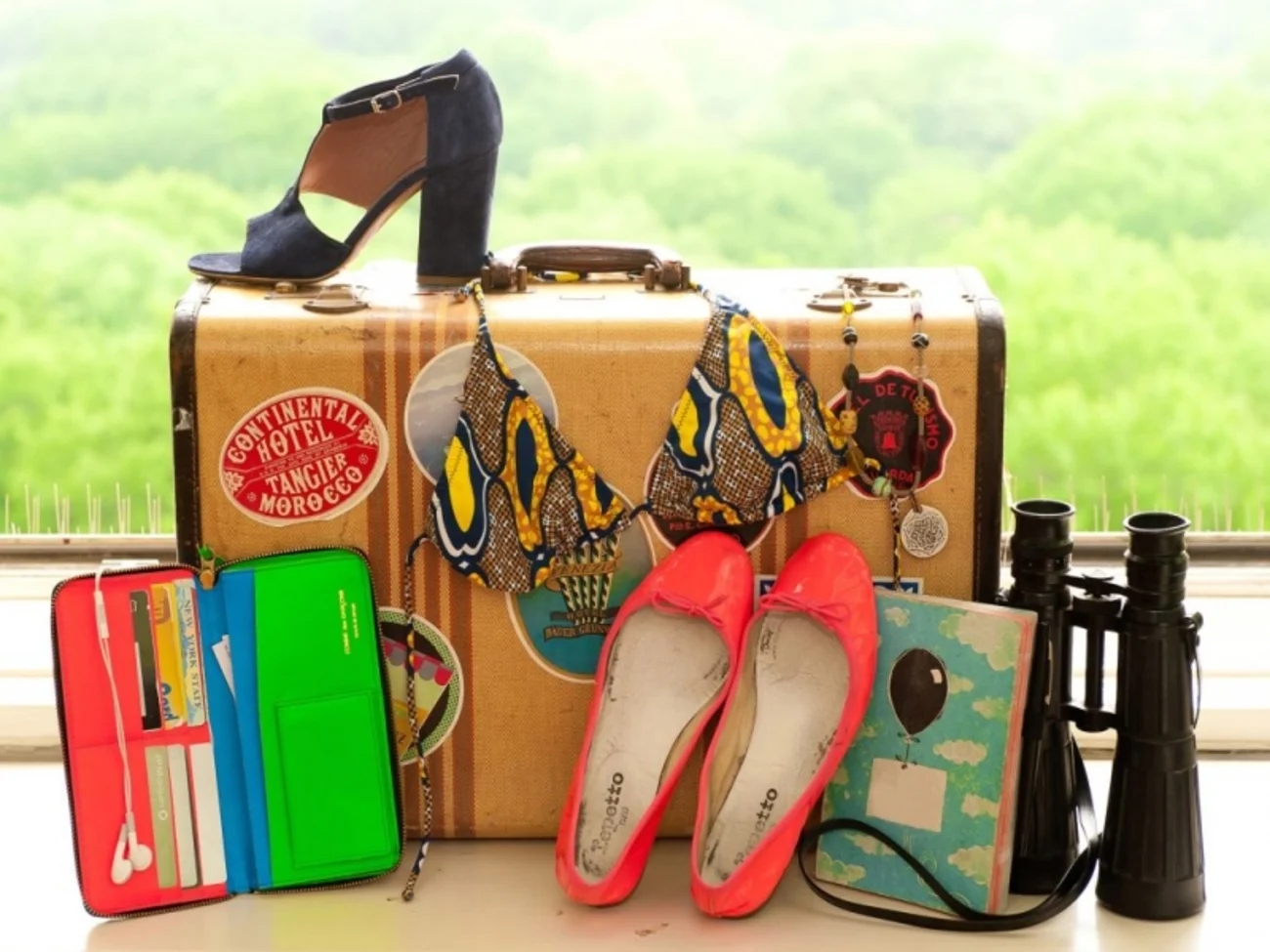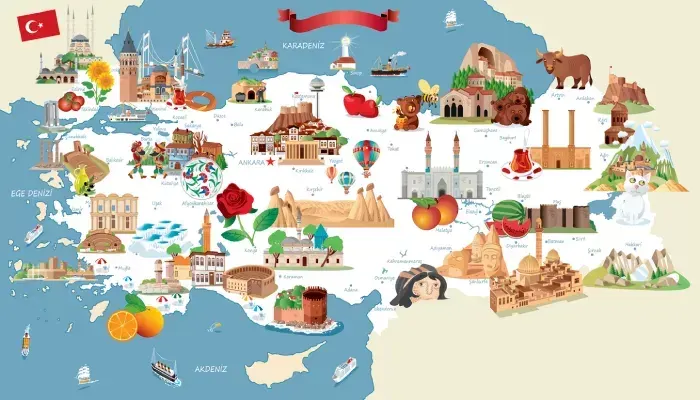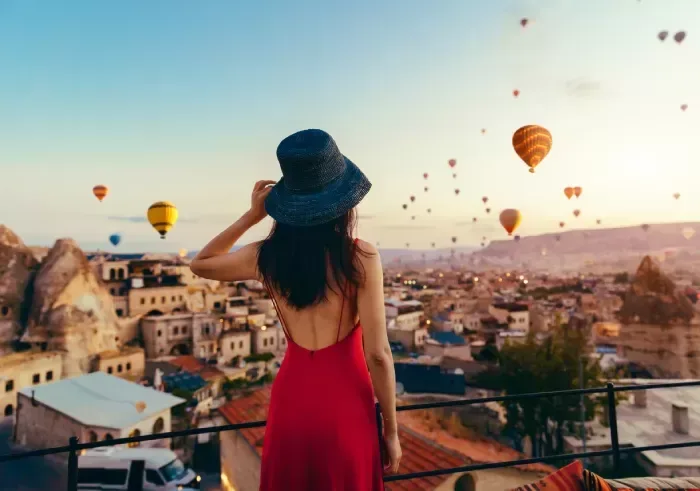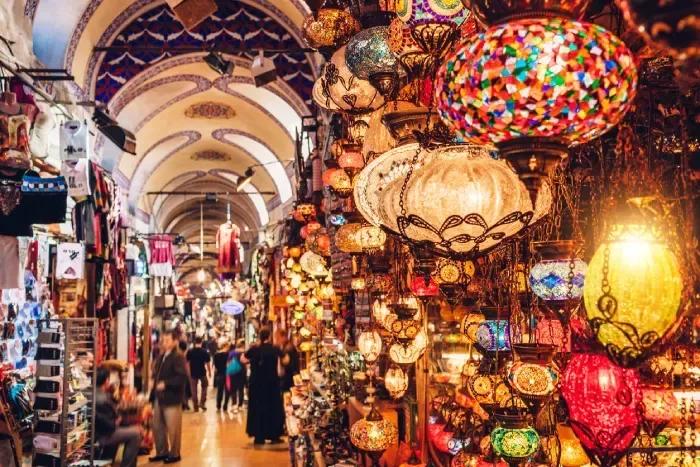23 Turkey Travel Tips That Locals Won't Tell You
Some travel tips for Turkey you have to know before you go to Turkey await you. Check it now!

Turkey ranks as one of the world's top tourist destinations, yet authentic local experiences elude many visitors. The country's vibrant culture comes alive in Istanbul, where 15 million residents fill its bustling streets. Its massive landscape spans 783,562 square kilometers and holds countless hidden treasures.
Guidebooks only scratch the surface of Turkey's charm. The country weaves an intricate tapestry of modern life and ancient history that captivates visitors. Traditional markets teach you the art of bargaining. Local customs shape daily life. Turkey's true character reveals itself through experiences that go beyond typical tourist attractions.
We have compiled 23 lesser-known tips from locals to enhance your journey. These valuable insights will help you direct your way through cultural etiquette and local transportation. You'll experience Turkey as a resident rather than a tourist passing through.
Turkey Travel Packages is an amazing way to explore the fascinating country, with a millennial history, stunning nature, a vibrant culture!

Packing
- Respect Local Norms: Modest attire fosters cultural connections, especially in rural and conservative areas.
- Adapt to Climate: Pack according to the region and season to stay comfortable.
Seasonal Considerations:
- Aegean Coastline: Pack for mild winters and hot summers.
- Black Sea Region: Prepare for frequent rain and high humidity.
- Inland Areas (Ankara, Cappadocia): Expect extreme temperatures—hot summers (up to 95°F/35°C) and cold winters (as low as 8.6°F/-13°C).
- Winter Travel (Dec-Feb): Bring thermal layers and waterproof boots, especially in eastern and northern regions.
- Summer Travel (Jun-Aug): Opt for light, breathable fabrics to stay cool.
Cultural Dress Codes:
- General Attire: Modern fashion is common in cities, but modest clothing shows cultural respect.
Sacred Spaces:
- Women: Wear ankle-length garments, cover arms to elbows, and use head coverings in mosques.
- Men: Avoid sleeveless tops and shorts.
- Urban vs. Rural: Western fashion is accepted in cities, but rural areas prefer modest dressing.
Regional Variations:
- Mediterranean Coast: Beachwear is fine, but keep modest cover-ups for non-beach areas.
- Central & Eastern Regions: Dress conservatively—knee-length garments and covered shoulders.
- Black Sea Region: Always carry rain protection due to frequent rainfall.
- Northern Regions: Layer clothing year-round for unpredictable weather.
Time to Visit
- Best Time to Visit: Spring (April-May) and autumn (September-October) for mild weather and fewer tourists.
- Festivals: Plan around cultural events for unique experiences.
- March: Celebrate Nevruz, a Persian-inspired spring festival with outdoor festivities.
- April: Experience Istanbul's Tulip Festival, where parks bloom with vibrant colors.
- Summer: Witness the historic Kırkpınar Oil Wrestling Festival, a tradition since 1360.
- September: Enjoy the Bozcaada Jazz Festival in the north Aegean.
- October: Attend the Antalya Golden Orange Film Festival for cinematic excellence.
- December: Explore the mystical Şeb-i Arus festival in Konya, featuring whirling dervishes
- Avoid Crowds: Visit in shoulder seasons or winter for quieter exploration.
- Peak Season (June-August): Crowded coastal areas and popular sites like Ephesus due to summer travel and cruise ships.
- Winter (December): Quieter except for holiday travelers; historical sites are less crowded but colder.
- Shoulder Seasons (April-May, September-October): are ideal for fewer crowds, pleasant weather, and a more relaxed experience.
- Weather Prep: Pack according to the season and region—light clothing for summer, layers for winter, and rain gear for spring.
Shopping
- Best Time to Shop: Mornings for fresh selections and fewer crowds.
- General Hours: Most shops operate from 9 AM to 7 PM.
- Traditional Bazaars: Often closed on Sundays.
- Grand Bazaar: A must-visit with 3,000 shops; mornings are ideal for fresh selections and lively interactions.
- Cash is King: Carry cash for traditional markets.
- Respect Holidays: Plan around major closures and early closings.
- Ramadan Feast: March 29-April 1
- Labor Day: May 1
- Eid Al-Adha: June 5-9
- Victory Day: August 30
- Republic Day: October 28-29
- Holiday Hours: Businesses close early (by 1 PM) on holiday eves.
- Summer Adjustments: Shops may open as early as 7 AM in hot regions.
- Engage with Vendors: Build connections through friendly negotiation and conversation.
Transportation
- Choose Coaches for Comfort: Opt for premium carriers for long-distance travel.
- Use High-Speed Trains: Fast and scenic for major routes like Istanbul-Ankara.
- Ferries for Coastal Travel: Ideal for Istanbul, Izmir, and Çanakkale.
- Local Transport: Use metros for speed, dolmuş for short trips, and taxis for convenience.
- Municipal Buses: Widely available with electronic payment systems.
- Dolmuş: Shared minibuses for short distances, connecting neighborhoods and villages.
- Metro: Fastest option in major cities like Istanbul.
- Taxis :
- Budget Wisely: Compare costs between buses, trains, and flights, including ground transfer.
- Buses: Affordable for long distances (e.g., Istanbul to Izmir: 85-95 TL).
- Trains: Similar pricing to buses, with added scenic value (e.g., Istanbul-Ankara: 70 TL).
- Flights: Budget-friendly for city-hopping (starting at 60 TL), but factor in ground transfer costs.

Food Experience
- Street Food: Stick to clean, popular stalls and avoid risky items.
- Dining Times: Plan meals around local schedules (lunch 12-2 PM, dinner 7-9 PM).
- Regional Dishes: Explore local specialties like
a:Istanbul:
- Crispy börek (pastries).
- Rich eggplant meze.
- Turkish delight from the Spice Bazaar.
b:Cappadocia:
- Testi kebab (clay pot kebab), requiring 24-hour preparation.
- Black Sea:
- Hamsi (anchovies) prepared in traditional recipes.
- Seasonal Delicacies: Try lüfer in October and olive oil-based dishes year-round.
Bathroom Situations
- Know the Types: Be ready for both Western and squat-style restrooms.
- Carry Essentials: Always have tissues, hand sanitizer, and small change.
- Respect Traditions: Embrace water-based cleansing practices.
- Plan: Use free facilities in mosques or established chains when possible.
Water Consumption
- Urban Areas: Tap water is generally safe but may taste chlorinated; consider bottled water for drinking.
- Rural Areas: Seek local advice on water safety; bottled water is the safest option.
- Bottled Water: Affordable and widely available; opt for damacana for extended stays.
- Restaurants: Expect bottled or filtered water; tap water is rarely served.
- Infrastructure: Be cautious in older buildings with potential pipe issues.
Religious Sites
- Dress Modestly: Follow dress codes for both men and women.
- Women: ( Cover head, shoulders, and knees - Wear below-knee attire )
- Men: ( Wear long trousers and sleeved shirts )
- General: ( Bring clean socks for barefoot areas - Use provided robes and headscarves if unprepared )
- Respect Prayer Times: Plan visits around mosque closures during prayers.
- General Hours: ( Mosques are open from 9:00 AM to 6:00 PM )
- Prayer Times: ( Closed for 90 minutes during prayer calls (5 times daily) - Friday afternoons: Closed until prayers conclude.)
- Hagia Sophia: ( Open from 9:00 AM to 7:30 PM. )
- Photography Etiquette: Be mindful of rules and avoid disrupting worship.
- Specific Sites:
- Hagia Sophia: Photography allowed, but no flash.
- Blue Mosque: Personal photography permitted, except during prayers.
- Commercial Photography: Requires prior written permission.
- Guided Tours: Consider guided visits for deeper historical and spiritual insights.
- Remember: Sacred spaces prioritize worship over tourism.
Local Banking Services
- ATM Safety: Use secure, well-lit ATMs and protect your PIN.
- Fee-Free Withdrawals: Stick to HSBC, Ziraat Bank, Halkbank, PTT, or ING.
- Bank Visits: Plan around lunch breaks and visit in the morning.
- General Hours: Open 9:00 AM to 5:00 PM on weekdays.
- Lunch Break: Closed from 12:30 PM to 1:30 PM.
- Extended Hours: Branches in shopping malls may operate longer hours, including weekends.
- Best Time: Visit in the morning for fewer crowds.
- Minimize Fees: Use partner banks, withdraw larger sums, and avoid currency conversion.
- Foreign Card Fees: Typically 7% to 15% per transaction.
İşbank Fees:
-
Domestic withdrawals: 3.50% (minimum 30 TRY).
-
International withdrawals: 3.15% + 3USD(minimum3USD(minimum7 USD).
- Notify Your Bank: Inform your bank of your travel plans to avoid card issues.
Emergency Situations
- Emergency Numbers: Memorize or save 112 for all emergencies and specialized numbers for specific needs.
- Hospitals: Public hospitals offer free emergency care, but private hospitals provide faster, better-equipped services.
- Insurance: Ensure your insurance covers medical expenses and carry necessary documents.
- Embassy Help: Save U.S. embassy and consulate contacts for emergencies.
- Language: Keep medical information in both English and Turkish for clarity.
Seasonal Activities
- Summer: Beat the heat with early mornings, book early, and escape to the highlands.
- Winter: Ski in renowned resorts, enjoy mild coastal weather, and relax in hammams.
- Shoulder Seasons: Travel in spring or autumn for perfect weather, fewer crowds, and affordable prices.
- Perfect Weather: ( Temperatures range between 15°C and 25°C. - Ideal for outdoor activities and cultural exploration. )
- Fewer Crowds: ( Enjoy authentic experiences without summer crowds.)
- Affordable Travel: ( Accommodation prices are lower with more availability. )
- Diverse Activities: ( Swim in the Mediterranean or explore hiking trails with wildflower blooms. )
Local Healthcare
- Private Hospitals: Preferred for quality care but require upfront payment.
- Pharmacies: Affordable and well-stocked; carry essential medications from home.
-
Pharmacies (Eczane): ( Identified by a red "E" on a white sign. - Open Monday-Saturday, 8:30 AM-7:00 PM. - Duty pharmacies operate after hours.)
-
Common Medications: ( Parol: Alternative to Tylenol. - Nurofen: Alternative to Ibuprofen. - Reflor: For stomach issues. )
-
Preparation: ( Bring sufficient medications from home in original packaging with prescriptions. )
- Insurance: Ensure coverage for medical emergencies, hospital stays, and evacuation.
- Preparation: Verify insurance acceptance and bring necessary medications.
Connectivity:
- Purchase a local SIM card for affordable data and calls.
- Free Wi-Fi is available in cafes, hotels, and airports.
Currency:
- Use Turkish Lira (TRY) for most transactions.
- Carry cash for small purchases, especially in markets and rural areas.
- ATMs are widely available; use those inside banks or shopping centers for safety.
Language:
- Learn basic Turkish phrases:
- Teşekkür ederim (Thank you).
- Evet/Hayır (Yes/No).
- Lütfen (Please).
- English is widely spoken in tourist areas, but learning a few words goes a long way.
General Tips
- Tourists should carry their ID and passport with them at all times for their safety.
- Printed or digital travel guides and maps informing about the location you are visiting will help you get around and save valuable time so that you can focus on things worth seeing and doing.
- Visitors who are planning to join the culture tours in İstanbul, or Turkey in general, will be granted faster and cheaper admission to museums in case they obtain a Museum Pass.
- Travelers who anticipate any possible traffic congestion can use the online check–in system before arriving at the airport and avoid running the risk of missing their flight.
- Tourists may benefit from tax-free shopping in Turkey by applying at the tax refund offices at the airports with their purchase receipts.
- Wearing comfortable clothes and sports shoes will make you feel more comfortable if you are planning to participate in cultural tours during your stay in Turkey.
- Obtaining a public transportation card and making use of public transportation facilities is more practical and cheaper if you intend to spend your holiday in one of Turkey’s metropolitan areas.
- İt is advisable to keep a Turkish dictionary with you at all times. Finding people who speak foreign languages may not be possible at all times.

Customize Your Dream Vacation!
Get in touch with our local experts for an unforgettable journey.
Plan Your TripTurkish wisdom flows like ancient rivers through these 23 sacred teachings. Beyond tourist paths lies a deeper realm where bazaar whispers and neighborhood customs paint authentic portraits of daily life.
Each grain of knowledge demands careful tending. Istanbul's Grand Bazaar guards centuries of bargaining arts, while Cappadocia's hidden valleys shelter timeless secrets. Simple acts - shoes left at thresholds, tea cups accepted with both hands - become keys unlocking Turkish hearts and homes.
These lands bridge yesterday's traditions and tomorrow's promises. Through seasonal dances and regional songs, through customs old as stone and conveniences fresh as morning bread, Turkey reveals her true character to those who approach with understanding hearts.
Here ends our gathering of wisdom, yet your journey's true beginning awaits. Pack your respect like precious cargo, wrap yourself in tradition's gentle guidance, and step forth into Turkey's embrace. Her ancient streets and modern squares, her mountain peaks and coastal coves stand ready to share their stories with those who listen well.
FAQs
Q1. Is Turkey safe for tourists?
Turkey is generally safe for tourists, but it's important to take basic precautions. Be aware of your surroundings, avoid displaying expensive items, and keep your belongings secure. Most areas are safe to walk around at night, but exercise caution as you would in any unfamiliar place.
Q2. Do I need to tip in Turkey?
Tipping is common in Turkey, especially in tourist areas. It's customary to tip 5-10% in restaurants, cafes, and bars for good service. Tips are also appreciated in hotels and other service industries. However, tipping is not mandatory, and the amount can be adjusted based on the quality of service.
Q3. What should I be cautious about when traveling in Turkey?
Be cautious of potential scams, especially in tourist areas. Always use official taxis or ride-hailing apps, and ensure the meter is running. Be wary of overly friendly strangers offering unsolicited help or invitations. When shopping in bazaars, be prepared to bargain, and always check prices before making a purchase.
Q4. How should I dress when visiting Turkey?
While Turkey is generally relaxed about clothing, it's respectful to dress modestly, especially when visiting religious sites. In mosques, women should cover their heads, shoulders, and knees, while men should avoid wearing shorts. In coastal areas and major cities, regular summer clothing is acceptable, but it's best to avoid overly revealing attire.
Q5. What are some must-try Turkish foods?
Turkish cuisine is diverse and delicious. Don't miss trying kebabs, which come in various types. Other must-try dishes include pide (Turkish pizza), meze (appetizers), baklava (sweet pastry), and Turkish delight. Street food like simit (sesame bread rings) and köfte (meatballs) are also popular. Don't forget to experience Turkish tea and coffee culture as well.














